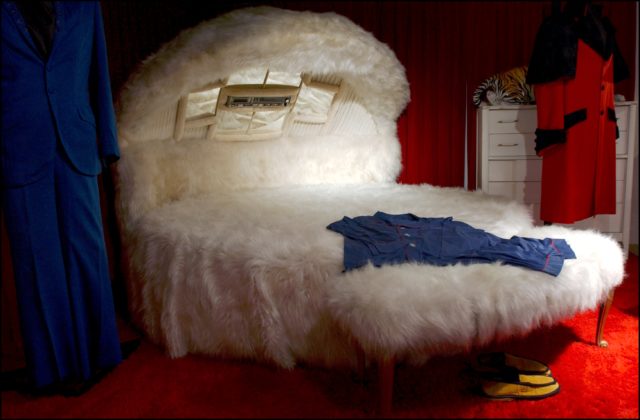When restorers began work on Graceland, Elvis Presley’s iconic Memphis mansion, they expected a straightforward renovation — a touch-up here, a wall reinforcement there. But what they uncovered behind one sealed section of the King’s private bedroom wall has left his family, fans, and historians reeling.
Behind the velvet-draped glamour and timeless legacy of the world’s greatest rock-and-roll star, a secret had been waiting — untouched, unrecorded, and heartbreakingly human.
The Discovery That Shook Graceland

It began with what seemed like a technical anomaly. A team conducting a digital scan of Graceland’s foundations noticed an unusual hollow space behind one of the bedroom walls. Initially, they suspected it was an old utility chamber or storage nook sealed off during past renovations. But when workers carefully opened the section, the air that escaped was still and dense — untouched for nearly half a century.
Inside was a small, dust-covered room no one in the Presley estate had ever seen listed in the original blueprints. The air smelled faintly of cedar and time. The furniture was simple — a worn chair, a small writing desk, and a lamp with a cracked shade. But the true treasure lay in the details: boxes of photographs, handwritten letters, and a set of leather-bound journals written entirely in Elvis Presley’s own hand.
In one corner, a locked metal chest, painted in faded gold, sat undisturbed. When gently pried open, it revealed a trove of cassette tapes, each labeled in Elvis’s distinctive scrawl: “Late Night Thoughts,” “July 1976,” and “The Quiet Room.”
What those recordings and writings revealed has redefined the way the world sees Elvis Presley — not just as a musical legend, but as a man wrestling with his own fame, identity, and loneliness.
“Everyone Sees the King. No One Sees Me.”

Family insiders confirmed that Elvis’s personal writings were deeply introspective, often revealing thoughts and emotions that contradicted his public persona.
In one journal entry, written in trembling script, he confided:
“I don’t know who I am anymore. Everyone sees the King. No one sees me.”
Another note described the crushing exhaustion of stardom:
“I live in a golden cage — the lights never go off, and the crowd never leaves. I’d give anything to walk down a street where nobody knows my name.”
Through these private reflections, Elvis emerges not as the confident showman the world adored, but as a man isolated by his own legend — a soul searching for peace in a world that demanded constant performance.
Letters Never Meant to Be Seen

Among the discoveries were several unsent letters, many addressed to those closest to Elvis. One, written years after his mother Gladys’s death, read like a confession:
“Mama, I lost my way after you left. I’ve been chasing something I can’t find — maybe I just want to come home.”
Another was addressed to Lisa Marie, his beloved daughter, written when she was only a child:
“Daddy’s sorry for being away so much. When the music stops, I promise I’ll be there. I just don’t know when that will be.”
These letters reveal a side of Elvis rarely seen — a devoted father and son tormented by guilt and longing, struggling to balance his responsibilities with the crushing demands of superstardom.
The Voice of the King — Unfiltered
But perhaps the most haunting discovery came from the cassette tapes found inside the gold-painted chest. According to audio experts working with the Presley estate, the tapes feature Elvis speaking freely, reflecting on fame, spirituality, and his declining health.
In one recording labeled “July 1976 – Late Thoughts,” Elvis can be heard saying in a tired but steady voice:
“I gave the world everything I had. But somewhere along the way, I lost myself. If I ever disappear, don’t look for the King — look for the man who just wanted peace.”
For decades, rumors circulated that Elvis had grown increasingly withdrawn and spiritual in his final years. These tapes appear to confirm those whispers, providing a rare window into the psyche of a man burdened by his own myth.
Why Was the Room Sealed?

The question that now grips fans and researchers alike is why the room was hidden in the first place.
Some experts believe it served as Elvis’s private sanctuary — a place where he could retreat, write, and meditate without the intrusion of fame or management. Others theorize he deliberately sealed it before his death, intending it to remain undiscovered until long after he was gone.
Whatever the motive, the timing aligns with reports from close associates who noticed Elvis becoming increasingly reclusive in the final years of his life. “He wanted silence,” one former bodyguard recalled. “He used to say the noise outside was too loud — that he couldn’t hear himself think anymore.”
A Painful Glimpse into the Final Years

Elvis Presley’s decline in the late 1970s has been the subject of endless speculation — from health issues to personal struggles. But the writings found in this secret room offer something more intimate than tabloids ever could: his truth.
He wrote about his fear of aging, the loss of artistic control, and the emptiness that fame could never fill. He also expressed a deep yearning for spiritual understanding, referencing meditation, the Bible, and even mystic teachings he had been exploring.
“I thought success would heal me,” one note reads. “But all it did was make the emptiness louder.”
These confessions humanize a man too often immortalized as a symbol — reminding us that the King of Rock and Roll was, above all, human.
The Family’s Reaction
The Presley estate has confirmed the authenticity of the find but has asked for privacy and discretion while the materials are examined by historians and preservation experts. Portions of the writings and recordings, they say, may one day be shared with the public in a curated exhibit — possibly as part of a future Graceland retrospective.
A family representative described the discovery as “both beautiful and devastating.”
“These writings show the heart of a man who loved deeply, suffered quietly, and still searched for meaning until the very end.”
The Legacy Reconsidered
The revelation has sparked renewed discussion about Elvis’s final years and what fame does to the human soul. For fans, it’s a bittersweet reminder that behind the sparkle of Vegas jumpsuits and thunderous applause was a man haunted by solitude.
In his final journal entry, one line stands out — simple, aching, and unforgettable:
“The lights go down, the crowd fades, and I’m left wondering — who loves the man when the music stops?”
That question now hangs over Graceland like a whisper from beyond time — a reflection of the loneliness that fame could never erase.
More Than a Myth
Elvis Presley has long been a paradox — an unstoppable performer and a fragile human being. For decades, fans have speculated about hidden rooms, secret writings, even conspiracy theories about his death. But this discovery cuts through all of that.
It’s not about myth or mystery. It’s about truth — the truth of a man who carried the weight of an empire on his shoulders and still longed for something simple: peace, connection, and love without conditions.
The hidden room behind Elvis Presley’s bedroom is now sealed again for preservation, but its meaning endures. It is no longer just part of Graceland’s architecture — it’s part of his soul’s story.
Through these fragile pages and trembling recordings, the world has been reminded that Elvis was not just a king — he was a man searching for light in a world that never stopped watching.
And in that search, perhaps, lies the greatest legacy of all.

